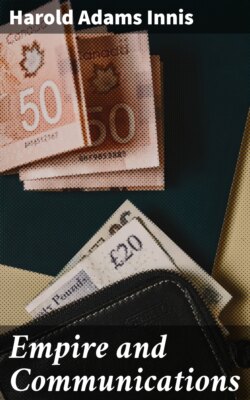Читать книгу Empire and Communications - Harold Adams Innis - Страница 6
На сайте Литреса книга снята с продажи.
Footnote
ОглавлениеTable of Contents
[1] Essays by the late Mark Pattison, collected and arranged by Henry Nettleship (Oxford, 1889), ii, pp. 400-1.
[2] Francis Edward Mineka, The Dissidence of Dissent (Chapel Hill, 1944), p. 278.
[3] Monthly Repository, 1834, p. 320. Cited ibid., pp. 278-9.
[4] Thomas Constable, Archibald Constable and His Literary Correspondents (London, 1873), p. 270.
[5] James Bryce, Studies in History and Jurisprudence (London, 1901), pp. 254-5.
[6] For a discussion of the background of political organization see F. J. Teggart, The Processes of History (New Haven, 1918).
[7] This does not refer to the mechanical spoken word which apparently Hitler had in mind in Mein Kampf. ‘I know that one is able to win people far more by the spoken than the written word. The greatest changes in the world have never been brought about by the goose quill. The power which set sliding the great avalanches of a political and religious nature was from the beginning of time, the magic force of the spoken word.’
[8] See H. M. Chadwick, The Heroic Age (Cambridge, 1926).
[9] See Emery Neff, A Revolution in European Poetry 1660-1900 (New York, 1940), ch. ii.
[10] See Otto Jesperson, Mankind, Nation and Individual from a Linguistic Point of View (Oslo, 1925), pp. 5-13.
[11] Ernst Cassirer, Language and Myth (New York, 1946), p. 38.
[12] Cited Jesperson, Mankind, Nation and Individual (Oslo, 1925), p. 139.
[13] Herbert Spencer, Philosophy of Style; An Essay (New York, 1881), p. 11.
[14] Cited Graham Wallas, The Great Society (London, 1914), p. 263.
[15] For a discussion of conditions favourable to historical writing see F. J. Teggart, Theory of History (New Haven, 1925).
[16] See C. L. Becker, Progress and Power (Stanford University, 1936); see also A. C. Moorhouse, Writing and the Alphabet (London, 1946).
[17] Edwyn Bevan, Hellenism and Christianity (London, 1921), p. 25.
[18] See Christopher Caudwell, Illusion and Reality: A Study of the Sources of Poetry (London, 1937), p. 51.
